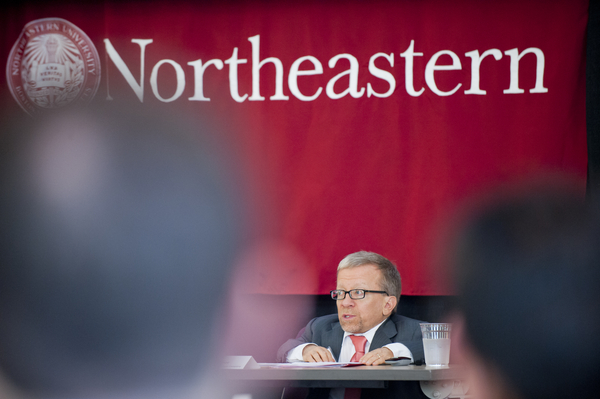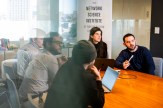Conference focuses on disability hiring

Northeastern University on Tuesday convened experts from industry and academia to discuss the challenges employers face and best practices for hiring people with disabilities, particularly college students and recent graduates.
Throughout the day, panelists at the employer roundtable noted that college graduates with disabilities continue to be underrepresented in the workforce, and that employers, advocates, universities, and people with disabilities must work together to increase their candidacy for employment and job retention.
The event was held in the Raytheon Amphitheater. Northeastern’s Department of Cooperative Education and Career Development presented the event in partnership with the university’s Disability Resource Center. Many of the employers on hand participate in the university’s signature co-op program, through which students integrate their rigorous classroom learning with real-world work experience.
“We feel it is important for us to bring our co-op employers together and discuss topics that are critically important to both sides of the house,” said Maria Stein, associate vice president of cooperative education and career development. “Working with students with disabilities is hugely important.”
A U.S. Census Bureau report last year noted that individuals with disabilities are less likely to be employed than those without disabilities, and that people with disabilities who were employed typically held jobs with lower earnings than their colleagues. Overall, individuals with disabilities accounted for 6 percent of the civilian labor force.
Keynote speaker Alan Muir, executive director and co-founder of Career Opportunities for Students with Disabilities, noted 10.8 percent of college graduates who have disclosed a disability are unemployed and 52.4 percent are underemployed. The organization, housed at the University of Tennessee, is comprised of more than 600 colleges and universities and more than 500 employers nationwide.
“There is a lot of hunger, a lot of interest, and a desire to work,” Muir said. “So it’s just a matter of getting the opportunities to those particular individuals.”
Muir and the event’s other speakers talked at length about the importance of trying to get students with disabilities to self-identify with their disability because it can benefit both them and their perspective employer during the hiring process. Muir
“There are a lot of companies who have not thought about this before, who have not participated in this market of hiring college graduates with disabilities that now are,” Muir said. “Self-ID is great because it expands the field of candidates.”
He also stressed that at universities and colleges, disability centers and career services departments need to have a strong relationship.
During a panel discussion, employers and disability hiring specialists agreed that educating executives, hiring managers, and human resource staff is an important step to ensuring that people with disabilities are not excluded from applicant pools.
Erika Faulkner, lead of human resources operations for DePuy Synthes, a part of Johnson & Johnson, said employers mustn’t wait to gather best practices for hiring people with disabilities. “You just have to go for it,” Faulkner said, “and you have to be willing to learn.”
Marci Shaffer, manager of career development for the young adult internship program Aspire, said employers need to understand it’s about changing how they view all their employees. “In many ways what we are talking about are your diversity initiatives,” Shaffer said.
At Northeastern, the Disability Resource Center works closely with the university’s co-op and career services offices to help advocate for students with disabilities as they prepare to enter the job market. The center seeks out opportunities for these students and also collects performance feedback from co-op employers.
“The Disability Resource Center has really become a model that is looked upon nationally for advice and counsel,” noted Veronica Porter, associate professor in the College of Science.





